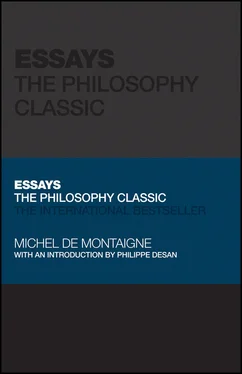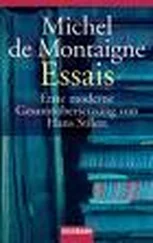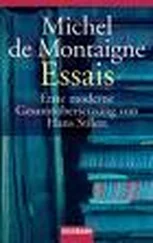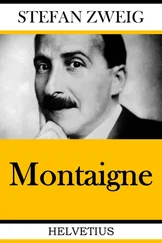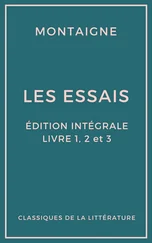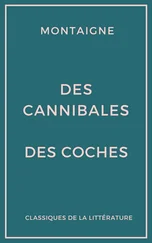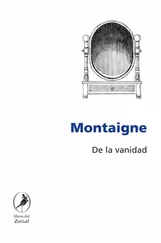Michel de Montaigne - Essays
Здесь есть возможность читать онлайн «Michel de Montaigne - Essays» — ознакомительный отрывок электронной книги совершенно бесплатно, а после прочтения отрывка купить полную версию. В некоторых случаях можно слушать аудио, скачать через торрент в формате fb2 и присутствует краткое содержание. Жанр: unrecognised, на английском языке. Описание произведения, (предисловие) а так же отзывы посетителей доступны на портале библиотеки ЛибКат.
- Название:Essays
- Автор:
- Жанр:
- Год:неизвестен
- ISBN:нет данных
- Рейтинг книги:3 / 5. Голосов: 1
-
Избранное:Добавить в избранное
- Отзывы:
-
Ваша оценка:
- 60
- 1
- 2
- 3
- 4
- 5
Essays: краткое содержание, описание и аннотация
Предлагаем к чтению аннотацию, описание, краткое содержание или предисловие (зависит от того, что написал сам автор книги «Essays»). Если вы не нашли необходимую информацию о книге — напишите в комментариях, мы постараемся отыскать её.
Essays: The Philosophy Classic
Essays: The Philosophy Classic
Essays — читать онлайн ознакомительный отрывок
Ниже представлен текст книги, разбитый по страницам. Система сохранения места последней прочитанной страницы, позволяет с удобством читать онлайн бесплатно книгу «Essays», без необходимости каждый раз заново искать на чём Вы остановились. Поставьте закладку, и сможете в любой момент перейти на страницу, на которой закончили чтение.
Интервал:
Закладка:
Vallere queis cura est albos a stirpe capillos,
Et faciem, dempta pelle, referre novam.
[Who carefully pluck out their grey hairs by the roots, and renew their faces by peeling off the old skin.
—Tibullus, i. 8, 45.]
I have seen some of them swallow sand, ashes, and do their utmost to destroy their stomachs to get pale complexions. To make a fine Spanish body, what racks will they not endure of girding and bracing, till they have notches in their sides cut into the very quick, and sometimes to death?
It is an ordinary thing with several nations at this day to wound themselves in good earnest to gain credit to what they profess; of which our king relates notable examples of what he has seen in Poland and done towards himself. [Henry III.] But besides this, which I know to have been imitated by some in France, when I came from that famous assembly of the Estates at Blois, I had a little before seen a maid in Picardy, who to manifest the ardour of her promises, as also her constancy, give herself, with a bodkin she wore in her hair, four or five good lusty stabs in the arm, till the blood gushed out to some purpose. The Turks give themselves great scars in honour of their mistresses, and to the end they may the longer remain, they presently clap fire to the wound, where they hold it an incredible time to stop the blood and form the cicatrice; people that have been eyewitnesses of it have both written and sworn it to me. But for ten aspers [a Turkish coin worth about a penny] there are there every day fellows to be found that will give themselves a good deep slash in the arms or thighs. I am willing, however, to have the testimonies nearest to us when we have most need of them; for Christendom furnishes us with enough. After the example of our blessed Guide there have been many who have crucified themselves. We learn by testimony very worthy of belief, that King St. Louis wore a hair-shirt till in his old age his confessor gave him a dispensation to leave it off; and that every Friday he caused his shoulders to be drubbed by his priest with five small chains of iron which were always carried about amongst his night accoutrements for that purpose.
William, our last Duke of Guienne, the father of that Eleanor who transmitted that duchy to the houses of France and England, continually for the last ten or twelve years of his life wore a suit of armour under a religious habit by way of penance. Foulke, Count of Anjou, went as far as Jerusalem, there to cause himself to be whipped by two of his servants, with a rope about his neck, before the sepulchre of our Lord. But do we not, moreover, every Good Friday, in various places, see great numbers of men and women beat and whip themselves till they lacerate and cut the flesh to the very bones? I have often seen it, and it is without any enchantment; and it was said there were some amongst them (for they go disguised) who for money undertook by this means to save harmless the religion of others, by a contempt of pain, so much the greater, as the incentives of devotion are more effectual than those of avarice. Q. Maximus buried his son when he was a consul, and M. Cato his when praetor elect, and L. Paulus both his, within a few days one after another, with such a countenance as expressed no manner of grief. I said once merrily of a certain person, that he had disappointed the divine justice; for the violent death of three grown-up children of his being one day sent him, for a severe scourge, as it is to be supposed, he was so far from being afflicted at the accident, that he rather took it for a particular grace and favour of heaven. I do not follow these monstrous humours, though I lost two or three at nurse, if not without grief, at least without repining, and yet there is hardly any accident that pierces nearer to the quick. I see a great many other occasions of sorrow, that should they happen to me I should hardly feel; and have despised some, when they have befallen me, to which the world has given so terrible a figure that I should blush to boast of my constancy:
Ex quo intelligitur, non in natura, sed in opinione,
esse aegritudinem.
[By which one may understand that grief is not in nature, but in opinion.
—Cicero, Tusculum Disputations ., iii. 28.]
Opinion is a powerful party, bold, and without measure. Whoever so greedily hunted after security and repose as Alexander and Caesar did after disturbance and difficulties? Teres, the father of Sitalces, was wont to say that “when he had no wars, he fancied there was no difference between him and his groom”. Cato the consul, to secure some cities of Spain from revolt, only interdicting the inhabitants from wearing arms, a great many killed themselves:
Ferox gens, nullam vitam rati sine armis esse.
[A fierce people, who thought there was no life without war.
—Livy, xxxiv. 17.]
How many do we know who have forsaken the calm and sweetness of a quiet life at home amongst their acquaintance, to seek out the horror of unhabitable deserts; and having precipitated themselves into so abject a condition as to become the scorn and contempt of the world, have hugged themselves with the conceit, even to affectation. Cardinal Borromeo, who died lately at Milan, amidst all the jollity that the air of Italy, his youth, birth, and great riches, invited him to, kept himself in so austere a way of living, that the same robe he wore in summer served him for winter too; he had only straw for his bed, and his hours of leisure from affairs he continually spent in study upon his knees, having a little bread and a glass of water set by his book, which was all the provision of his repast, and all the time he spent in eating.
I know some who consentingly have acquired both profit and advancement from cuckoldom, of which the bare name only affrights so many people.
If the sight be not the most necessary of all our senses, it is at least the most pleasant; but the most pleasant and most useful of all our members seem to be those of generation; and yet a great many have conceived a mortal hatred against them only for this, that they were too pleasant, and have deprived themselves of them only for their value: as much thought he of his eyes that put them out. The generality and more solid sort of men look upon abundance of children as a great blessing; I, and some others, think it as great a benefit to be without them. And when you ask Thales why he does not marry, he tells you, because he has no mind to leave any posterity behind him.
That our opinion gives the value to things is very manifest in the great number of those which we do, not so much prizing them, as ourselves, and never considering either their virtues or their use, but only how dear they cost us, as though that were a part of their substance; and we only repute for value in them, not what they bring to us, but what we add to them. By which I understand that we are great economisers of our expense: as it weighs, it serves for so much as it weighs. Our opinion will never suffer it to want of its value: the price gives value to the diamond; difficulty to virtue; suffering to devotion; and griping to physic. A certain person, to be poor, threw his crowns into the same sea to which so many come, in all parts of the world, to fish for riches. Epicurus says that to be rich is no relief, but only an alteration, of affairs. In truth, it is not want, but rather abundance, that creates avarice. I will deliver my own experience concerning this affair.
I have since my emergence from childhood lived in three sorts of conditions. The first, which continued for some twenty years, I passed over without any other means but what were casual and depending upon the allowance and assistance of others, without stint, but without certain revenue. I then spent my money so much the more cheerfully, and with so much the less care how it went, as it wholly depended upon my overconfidence of fortune. I never lived more at my ease; I never had the repulse of finding the purse of any of my friends shut against me, having enjoined myself this necessity above all other necessities whatever, by no means to fail of payment at the appointed time, which also they have a thousand times respited, seeing how careful I was to satisfy them; so that I practised at once a thrifty, and withal a kind of alluring, honesty. I naturally feel a kind of pleasure in paying, as if I eased my shoulders of a troublesome weight and freed myself from an image of slavery; as also that I find a ravishing kind of satisfaction in pleasing another and doing a just action. I except payments where the trouble of bargaining and reckoning is required; and in such cases; where I can meet with nobody to ease me of that charge, I delay them, how scandalously and injuriously soever, all I possibly can, for fear of the wranglings for which both my humour and way of speaking are so totally improper and unfit. There is nothing I hate so much as driving a bargain; it is a mere traffic of cozenage and impudence, where, after an hour's cheapening and hesitating, both parties abandon their word and oath for five sols’ abatement. Yet I always borrowed at great disadvantage; for, wanting the confidence to speak to the person myself, I committed my request to the persuasion of a letter, which usually is no very successful advocate, and is of very great advantage to him who has a mind to deny. I, in those days, more jocundly and freely referred the conduct of my affairs to the stars, than I have since done to my own providence and judgment. Most good managers look upon it as a horrible thing to live always thus in uncertainty, and do not consider, in the first place, that the greatest part of the world live so: how many worthy men have wholly abandoned their own certainties, and yet daily do it, to the winds, to trust to the inconstant favour of princes and of fortune? Caesar ran above a million of gold, more than he was worth, in debt to become Caesar; and how many merchants have begun their traffic by the sale of their farms, which they sent into the Indies:
Читать дальшеИнтервал:
Закладка:
Похожие книги на «Essays»
Представляем Вашему вниманию похожие книги на «Essays» списком для выбора. Мы отобрали схожую по названию и смыслу литературу в надежде предоставить читателям больше вариантов отыскать новые, интересные, ещё непрочитанные произведения.
Обсуждение, отзывы о книге «Essays» и просто собственные мнения читателей. Оставьте ваши комментарии, напишите, что Вы думаете о произведении, его смысле или главных героях. Укажите что конкретно понравилось, а что нет, и почему Вы так считаете.
